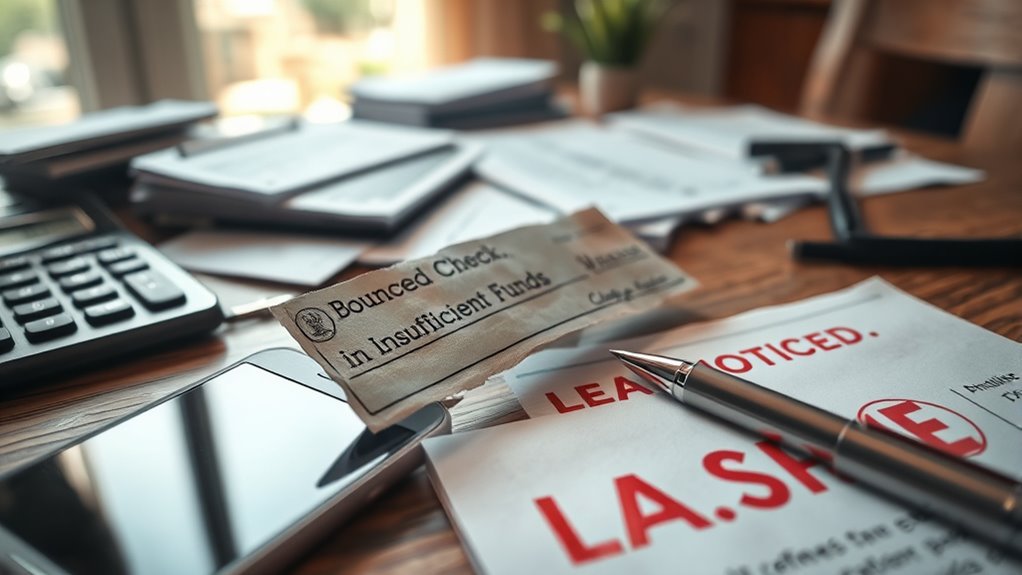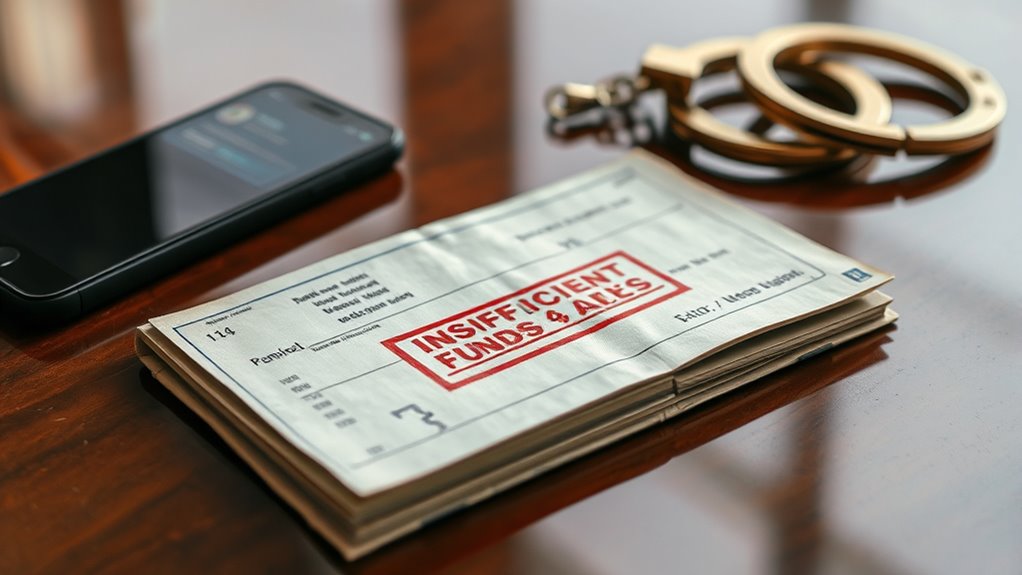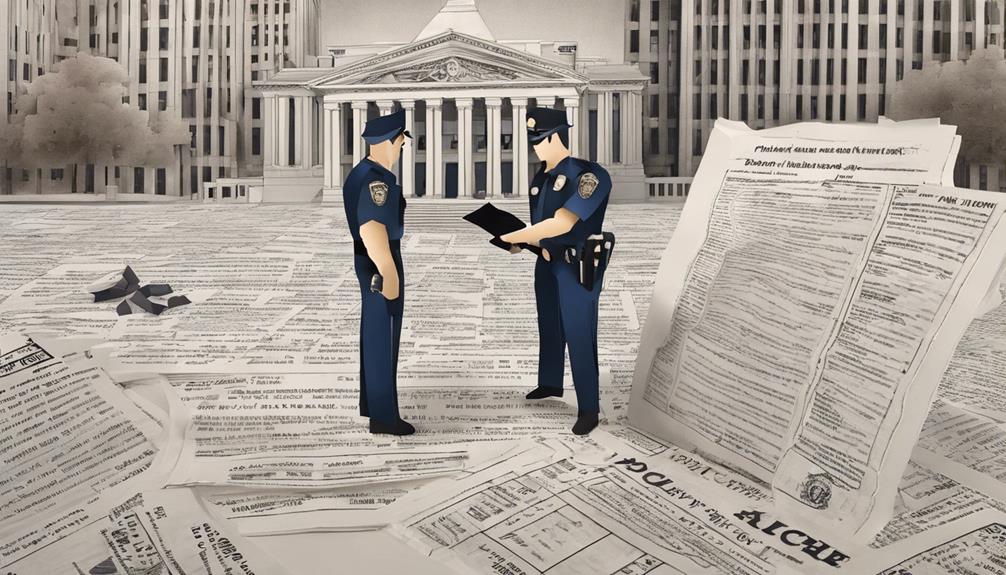If you bounce a check and it involves a significant amount or repeated offenses, it could lead to an arrest warrant. Authorities may see it as fraud or theft, especially if they suspect you intended to deceive. Even small bounced checks can become serious if ignored or if they’re part of a pattern. Understanding the legal rules and consequences can help you avoid hefty penalties—stick around to learn more about how this can affect you.
Key Takeaways
- Writing a check with insufficient funds is often a criminal offense that can lead to arrest, especially if fraud is suspected.
- Repeated bounced checks or those involving large sums increase the likelihood of felony charges and warrants.
- Intentionally writing bad checks to deceive payees can be prosecuted, resulting in arrest warrants for fraud.
- Authorities may pursue arrest warrants if they suspect the bounced check was part of a deliberate scheme.
- Failing to address bounced checks promptly or ignoring legal notices can escalate to criminal charges and warrants.

If you’ve ever written a check that bounces, you know it can be an embarrassing and stressful experience. But beyond the immediate embarrassment, there are serious legal consequences and financial repercussions you should understand. When a check bounces, it means there wasn’t enough money in your account to cover the amount you wrote. While this might seem like a simple banking mistake, it can escalate into legal trouble if not handled properly. Banks typically charge fees for bounced checks, and your account could be frozen or closed, making it harder to manage your finances. Additionally, if the check was written to settle a debt or pay a bill, bouncing it could lead to accusations of fraud or theft, especially if you intentionally wrote a check knowing insufficient funds existed.
In many states, writing a bad check can be classified as a criminal offense, especially if the amount is significant or if there are repeated offenses. The legal consequences vary depending on the amount involved and whether you have a history of similar actions. For smaller amounts, you might face a misdemeanor charge, which could result in fines, probation, or community service. Larger sums or repeated offenses can lead to felony charges, carrying more severe penalties, including jail time. It’s essential to realize that authorities can pursue criminal charges if they suspect you deliberately wrote a bad check to defraud someone or a financial institution.
The financial repercussions extend beyond legal penalties. A bounced check can damage your credit score, especially if it leads to collections or legal judgments. Your bank might report the incident to credit bureaus, making it harder to obtain loans or credit cards in the future. Furthermore, if a check bounces and the payee files a complaint, you could be sued for the amount owed, plus interest and legal fees. This can quickly spiral into a costly situation that drains your finances and damages your reputation. Ignoring bounced checks doesn’t make the problem go away; it often worsens the consequences.
To avoid these problems, always keep track of your account balance, and consider setting up overdraft protections or alerts for low funds. If you do bounce a check, address the issue immediately by paying the amount owed and communicating with the payee or your bank. Taking prompt action can sometimes prevent legal action and minimize the financial damage. Remember, bouncing a check isn’t just a banking mistake—it can have far-reaching legal and financial consequences that you’ll want to handle carefully. Additionally, understanding Gold IRA Rollovers can help diversify your assets and improve your overall financial security in case of financial setbacks like bounced checks.
Frequently Asked Questions
Can I Clear a Bounced Check Without Legal Consequences?
If you want to clear a bounced check without legal consequences, act promptly. You can work with the check recipient for check recovery or consider bankruptcy options if debts pile up. Paying the amount owed shows good faith and may prevent legal issues. Always communicate openly, settle the debt quickly, and avoid ignoring the problem. Taking these steps helps you resolve the situation smoothly and avoid potential arrests or penalties.
What Penalties Exist for Bouncing a Check Intentionally?
Think of bouncing a check with fraudulent intent as throwing a stone into a pond—ripples of consequences follow. If you do this intentionally, you could face serious penalties, including criminal charges, fines, and even jail time. Civil penalties might also hit your wallet hard, as courts can order you to repay the bounced amount plus additional fees. It’s a risky game that can damage your reputation and financial future.
How Long Does It Take for a Warrant to Be Issued?
The check timing and the warrant process vary depending on your jurisdiction, but typically, authorities act once they confirm unpaid checks or fraud. If you neglect to address a bounced check, a warrant can be issued within days to weeks. Usually, once the check is reported and the issue unresolved, law enforcement begins the warrant process, which involves court review and official notification, potentially leading to an arrest if you don’t respond promptly.
Can I Negotiate a Settlement After Bouncing a Check?
You can often negotiate a settlement after bouncing a check, especially if it’s related to check fraud or debt collection. Contact the creditor or debt collector directly to discuss your situation and propose a payment plan. Be proactive and transparent to avoid further legal issues. Keep in mind, resolving the debt quickly can help prevent escalation to warrants or criminal charges. Always consider consulting a legal professional for guidance.
Are There Differences in Laws by State Regarding Bounced Checks?
Think of state regulations and check laws as different roads leading to the same destination, but with unique traffic signs. You’ll find that laws about bounced checks vary across states, affecting penalties and procedures. Some states treat bounced checks as civil issues, while others see them as criminal offenses. So, you must know your state’s specific laws to navigate the legal landscape safely and avoid unexpected detours.
Conclusion
If your check bounces, think of it like a domino falling—small actions can lead to big consequences. An arrest warrant might be triggered, turning a simple mistake into a serious legal issue. Stay on top of your finances and resolve any issues quickly to avoid this chain reaction. Remember, ignoring bounced checks is like ignoring a warning sign on a stormy road—you’re risking a crash. Handle your checks responsibly, and keep your financial journey smooth.









